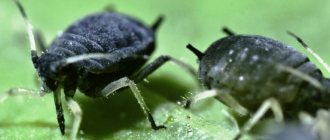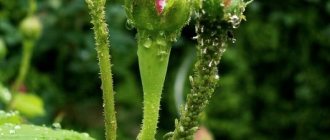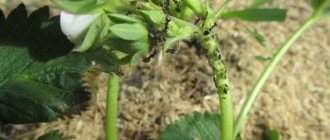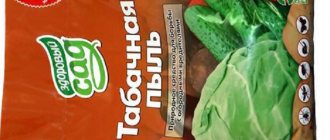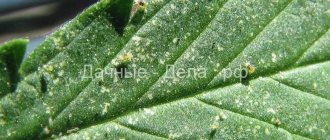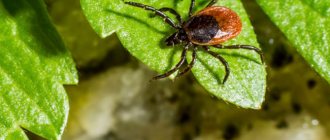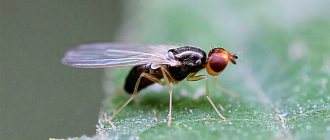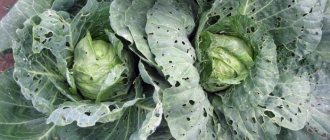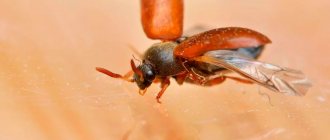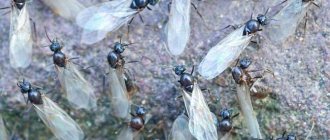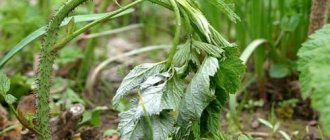Features of a plant parasite
Any plant with soft tissue can be attacked by this small and very harmful plant parasite, but the insect prefers to use the tips of shoots and buds for feeding.
The size of the pest does not exceed a few millimeters. These phytophages, common in our country, have a special proboscis with which they pierce the surface of shoots or foliage. Regardless of the species, aphids have both wingless and winged forms.
Aphids use plant juices for nutrition, which are rich in carbohydrates due to the presence of amino acids. In the process of feeding, aphids secrete a significant amount of a sweet composition called honeydew. This sticky and sweet solution is very attractive to many types of insects and vertebrate pests.
Preventive measures
To prevent pests:
- place trapping belts against ants, since they are companions of aphids;
- destroy the ant clutch by pouring boiling water over it;
Damaged bird cherry leaves.
- Sprinkle the trunk to remove honeydew and sooty fungus;
- clean the peeling bark from the crown and branches;
- feed the plant with nitrogen fertilizers in the spring; in the fall, use fertilizers with potassium and phosphorus;
- do not water the tree often;
- inspect the trunk in a timely manner, trim the crown 2 times a year, remove the affected branches;
- Garden varnish is applied to the cut areas.
Signs of a pest
The common bird cherry aphid or Rhopalosiphumpadi L. is a migratory species of plant parasite and is capable of transmitting viral diseases of cereal crops. The spring generation of bird cherry aphids is characterized by development on bird cherry trees during the period when the plant's buds begin to open . The aphid colony is located on the apical part of the shoots, as well as on the underside of the foliage and flower clusters. In the first half of May, bird cherry is attacked by winged females, and the breeding period is accompanied by the massive formation of dense and dense colonies on various above-ground parts of the plant.
During the summer period, about seven to eight generations of a plant parasite can develop, which use plant sap for nutrition and weaken the growth and development of the plant. In the first half of September, the process of reverse migration of aphids from cereal crops to bird cherry occurs, after which the larvae of the autumn generation hatch. Also, oviposition occurs in the winter , and the oviposition site is the base of a bud on one- and two-year-old shoots, or cracks in the bark.
If aphids have appeared en masse on the bird cherry tree, then it is necessary to treat the plant. To get rid of aphids, you can use chemical insecticides or use effective folk remedies.
Methods for controlling aphids
Aphids on bird cherry
The choice of method to combat small pests depends on the degree of damage to the bushes and the season. If the number of aphids is not large, then in the initial stage of infestation it is better to fight with traditional methods, which will allow you to get rid of aphids on bird cherry relatively harmlessly to humans and plants.
The best chemicals
When there is a massive infestation of bird cherry by aphids, the plant parasite must be combated with highly effective and relatively toxic chemicals. It will not be possible to get rid of the pest using plant remedies, and lost time can be disastrous for the garden crop.
| Drug name | Preparation of working solution | Method and terms of processing | Average consumption rates |
| "Spark" | One tablet per 10 liters of water. First, the tablet must be dissolved in a small amount of water, after which the working solution is brought to a volume of 10 liters. | Several times during the growing season | 10l for 1-5 trees |
| "Inta-Vir" | One tablet must be dissolved in a small amount of water, after which the working solution is brought to a volume of 10 liters. | Spraying the crown of the plant at the end of flowering | Solution in an amount of 2-10 liters per tree |
| "Aktara" | Dissolve approximately 2-4 g of the drug in 10 liters of water. | Several times during the growing season | 10l for 1-5 trees |
| "Fitoverm" | Dilute 2 ml of concentrated emulsion in a liter of water | Spraying during the growing season with 0.2% working solution | Depending on the age of the plant. |
Spraying should be carried out in dry, partly sunny weather, in the evening. The working solution is poured into a special sprayer. If the rules of use are followed, insecto-fungicides are not phytotoxic. The use of tank mixtures is allowed.
Biology guards your garden: birds and insects against aphids
To prevent aphids from annoying your garden, you need to call insects and birds, which are the main enemies of pests, as allies. The most harmful to aphids are:
- ladybugs, and especially their larvae;
- lacewings;
- ground beetles;
- hoverflies;
- predatory bugs;
- wasps;
- sparrows;
- kings;
- warblers;
- tits;
- wrens;
- linnets.
In order to attract insects that destroy aphids to your site, plant spicy and aromatic plants: dill, parsley, cloves, carrots, and nettles. Ladybug is very fond of calendula, which will also help decorate your garden.
Ladybug is one of the main enemies of aphids
Birds mainly feed captured aphids to their chicks. To attract birds to your site, install feeders, birdhouses and drinking bowls in accessible places.
Many plants have properties that either repel or attract aphids. This can also be used to kill pests. Plant flowers such as petunia, begonia, mallow, cleome and nasturtium away from vegetables and trees - aphids will concentrate their attention on them and be distracted from garden plantings. Among the trees, such plants include bird cherry, linden and viburnum.
Please note: in the fall, after flowering has ended, all plants that you planted to attract aphids to them must be harvested and destroyed. Either burn them or take them off-site, otherwise the aphid clutch will overwinter in comfortable conditions and bring you trouble again in the spring.
Marigolds, garlic and onions, fennel, Dalmatian chamomile, mint and coriander, on the contrary, repel aphids with their sharp spicy odors, so it will be useful to plant them in beds and between rows in the garden.
Effective folk remedies
If the scale of the damage is insignificant and if the pest is detected at the initial stage of colonization, experienced gardeners recommend using folk remedies that are not toxic, but cope well with the problem of destroying plant parasites.
| Means | Cooking rules | Features of use |
| Wood ash infusion | For 10 liters of water, add 1 cup of wood ash, a tablespoon of mustard and a tablespoon of liquid soap. Pour 3 liters of hot water, stir well and leave for a day | Add the working solution with water to 10 liters, strain and treat the plant twice, at intervals of a week. |
| Tobacco infusion | For 10 liters of water, add 1 cup of tobacco dust or shag, a tablespoon of mustard and a tablespoon of liquid soap. Pour 3 liters of hot water, stir well and leave for a day | Add the working solution with water to 10 liters, strain and treat the plant twice, at intervals of a week. |
| Nettle decoction | Finely chop the young stems, fill the container to ½ volume and add water. Leave for two weeks and strain | Before spraying, the working solution must be diluted with water in a ratio of 1:20 |
| Tansy decoction | Pour 1 kg of fresh plants into 10 liters of water and boil for 2 hours | Before spraying, strain and add 40 g of crushed laundry soap |
| Decoction of tomato or potato tops | Add 4-4.5 kg of chopped tops to a bucket of water and leave for three hours. Boil over low heat for ½ hour, cool and strain | Immediately before use, dilute the decoction with water in a ratio of 1:4 |
| Onion peel infusion | Pour three glasses of husk into 1 liter of hot water and leave for two days. | Before processing, strain the infusion and dilute with water in a ratio of 1:2 |
How to process correctly
It is advisable to apply the products with a garden sprayer so that the liquid completely wets the entire crown on all sides of the leaves. To protect your body and eyes, use wide goggles and thick clothing. The preparations should be sprayed towards the wind.
During the flowering period
The start of work should occur at a time when the snow melts and the air temperature reaches +5°C. At this time, the buds are just beginning to wake up, and there is still a small margin of time before flowering. During the flowering period, it is better to postpone any work to exterminate parasites. Otherwise, you can disrupt the process and end up without a harvest.
During fruiting
During the period of intensive fruit growth, it is also advisable to postpone work on exterminating aphids. Moreover, at this time, berries and fruits accumulate a lot of liquid; if there are toxic chemicals in the tree sap, they will inevitably penetrate into the fruits. Or you need to use only the safe methods listed above.
After harvest
There are no restrictions during this period. Before preparing for wintering, you need to remove too long and old branches along with aphids and burn them. At the same time, you can treat the trees with the most powerful and long-circulating substances. They will ensure the complete destruction of the colony. And next spring, a healthy tree will quickly increase its vegetative mass and continue to bloom vigorously.
Biological products
You can protect bird cherry from aphid attacks using products based on waste products of fungi, bacteria, and other microorganisms. The action of biological products is not as rapid as that of insecticides, but does not cause harm to the environment.
It is necessary to spray the plant in dry, windless weather. Rain significantly reduces the effectiveness of the drug. The procedure should be repeated after 14 days. For prevention, use the drug once a month.
The most popular remedies for aphids on bird cherry:
The drugs disrupt the natural processes in the body of insects and lead to death.
It is necessary to begin pest control in late autumn, removing weeds from the garden, digging up the soil, pouring warm water over the bird cherry, the effect is consolidated in early spring. Preventive measures are carried out throughout the warm season.
Source
Wood rot
Wood rot begins to develop due to the tinder fungus. The plant becomes infected through wounds on the bird cherry bark. As wood rots, there is a change in its physical and chemical properties, as well as structure. If you promptly detect the point of penetration of the fungus and strip it down to healthy wood, and also cover it with clay mixed with fungicide, this can save the plant. If the disease is advanced, then the bird cherry can no longer be saved.
